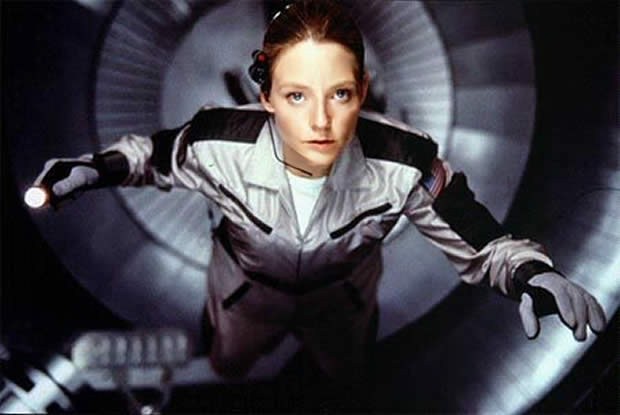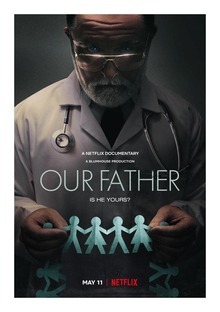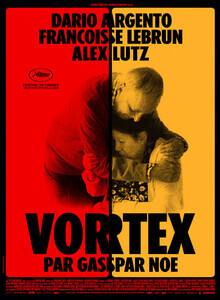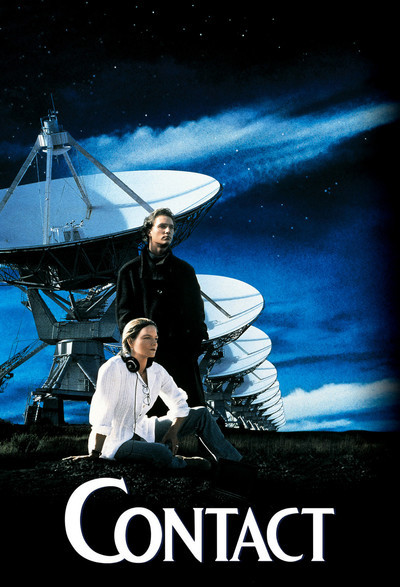
Now streaming on:
"Contact" is a film that takes place at the intersection of science, politics and faith. Those are three subjects that don't always fit easily together. In the film, an alien intelligence transmits an image of three pages of encrypted symbols. It is clear where the corners of each page are. It is also clear that the three corners are intended to come together in some way to make single image. Scientists are baffled in their attempts to bring the pages together. The solution, when we see it, provides an Eureka Moment. It is so simple, and yet so difficult to conceive of. It may be intended as a sort of intelligence test.
Watching the film again after 14 years, I was startled by how bold it is. Its heroine is a radio astronomer named Dr. Eleanor Arroway (Jodie Foster), who is an atheist. In the film she forms a cautious relationship with Palmer Joss (Matthew McConaughey), a believer in God who writes about science. Key roles are played by science advisors to the President, who see aliens, God and messages from space all in cynical political terms. They justify their politics with the catch-all motive of "national defense."
When the movie was released in July 1997 I had more or less the same beliefs I have now about the existence of God and the possibility of life elsewhere in the universe. Yet reading my review I find the movie didn't seem as brave to me then as it does now. Perhaps that's because I've since become involved in so much discussion about Creationism, another topic that stands at the intersection of science, politics and faith. Hollywood treats movies like a polite dinner party: Don't bring up religion or politics.
The encrypted signal, when opened, contains plans for the manufacture of an enormous machine, apparently a space craft of some sort, which will presumably take a single human to a meeting with the alien intelligence on a planet circling Vega, the fifth brightest star in the night sky, about 25 light years away from Earth.
A key element of the film involves Congressional hearings to determine who should be the astronaut aboard the ship. Although an international team of candidates has been selected, the cost of the ship has mostly been paid by the U. S., and for political reasons the astronaut will be American. Ellie, whose team received the message, is one of the candidates. At a late point in the hearings, Palmer Joss blindsides Ellie by asking her if she believes in God. She answers honestly. This raises a question: Should the first human to meet an alien believe in God? Ellie loses the prize to her boss, David Drumlin (Tom Skerritt), an opportunist who has taken credit for her pioneering work in SETI (the Search for Extraterrestrial Intelligence). That she eventually ends up making the trip owes something to the actions of another true believer.
The movie is based on a novel by Carl Sagan, who told us with such joy that there are "billions and billions of stars up there." As a child fascinated by the stars, Ellie asks her father (David Morse) if there are humans on other planets, and he tells her: "If we are alone in the Universe, it sure seems like an awful waste of space." The quote is often attributed to Sagan. Despite her disbelief in an afterlife, Ellie has always yearned to meet her mother, who died in childbirth, and perhaps that was what drew her eyes to the sky as a small girl. Later, as an honored academic, she turns down a teaching post at Harvard to work on a SETI project in Puerto Rico. Funding for that search is withdrawn by the hypocritical David Drumlin, who doesn't approve of pure research and believes science should provide "practical results."
"Contact" was directed by Robert Zemeckis, whose work often employs daring technical methods. Remember his mixture of animation and live action in the pre-CGI days of "Who Framed Roger Rabbit" (1988). Look at the way he embedded Forrest Gump (1994) amid real people. Look at the way he used motion capture in "The Polar Express" (2004), "Beowulf" (2007) and "Disney's A Christmas Carol" (2009). In "Contact" he startled his audiences by using real CNN anchors to cover the story in the movie, and embedding an obviously real President Bill Clinton.
Clinton didn't actually act in the movie (his scenes sound appropriate but could be about anything). But those were real CNN people. Was it proper for reporters to play themselves in fiction? Network president Tom Johnson said at the time that the experiment was a bad idea, and would not be repeated; that memo apparently didn't get read. What worked in "Gump" as a joke struck a false note in the greater realism of "Contact."
In "Contact," I was particularly absorbed by the conversations between Ellie and Palmer, the atheist and the believer. They like one another; indeed, they even go to bed once, but love is cut short because Ellie can do the math and realizes if she gets to travel on the alien machine the logic of moving at light speed means no one she knows will be alive when she returns--including Palmer and their children, if any. Still, he loves her, and much is made of a little plastic toy he finds in a Cracker Jack box--a compass. But if the woman he loves doesn't believe in God, she shouldn't make the trip. (The various astronaut candidates presumably believe in different Gods, but that's only a detail.)
I will not describe what happens to Ellie after she takes the trip. There was much debate at the time about whether she, in fact, ever left earth, although a line of dialog about 18 hours of static seems to be significant. The more you think about the logic involved, the more fascinating the movie becomes. The original signal received from space is the first television signal ever broadcast on earth, and since we know when that was, we know how many years it would have needed to make the round trip.
That suggests at the least an alien program to search for such signals and bounce them back along with code for a series of prime numbers, a universal indication of intelligence. What else does it suggest? That the aliens are still alive, or only their program? What would be the purpose of their machine? Actual physical space travel, or an experience not unlike the one had by the hero of "2001," who finds himself in an environment that has apparently been created by information in his own mind? What does she learn from the aliens of any use? What could be taught?
Jodie Foster is an ideal candidate for the role of Ellie Arroway. Smart, to the point, she explains that the purpose of Science is to discover Truth, wherever it is. That's where scientists disagree with Creationists, who believe they already know the Truth and it's the purpose of science to find the truth they know. You can see how that could engender some uneasiness about pure research; the danger is that you could find out something you don't want to know.
Matthew McConaughey's character is a good and sincere man, but I was confused by his ability to turn up everywhere. Just because he's written books on science and religion, why is he mysteriously invited to every high-level meeting and given so much influence? Another problematical character is Joseph (Jake Busey), who is way over the top as an evangelist, and curiously immune to routine security procedures.
The strength of "Contact" is in the way it engages in issues that are relevant today, and still only rarely discussed in the movies. Consider the opposition to stem cell research, which in a sense is "pure research." Consider the politicians who disparage separation of church and state. When Ellie was asked by Congress if she believed in God, the correct reply would have been, "that is none of your business." That would have been the correct reply of any American, no matter whether they believed in God or not.
Roger Ebert was the film critic of the Chicago Sun-Times from 1967 until his death in 2013. In 1975, he won the Pulitzer Prize for distinguished criticism.







150 minutes
Rob Lowe as Richard Rank
James Woods as Michael Kitz
Matthew McConaughey as Palmer Joss
Jodie Foster as Dr. Eleanor Arroway
Angela Bassett as Rachel Constantine
Tom Skerritt as David Drumlin
John Hurt as S.R. Hadden
David Morse as Ted Arroway
William Fichtner as Kent Clark